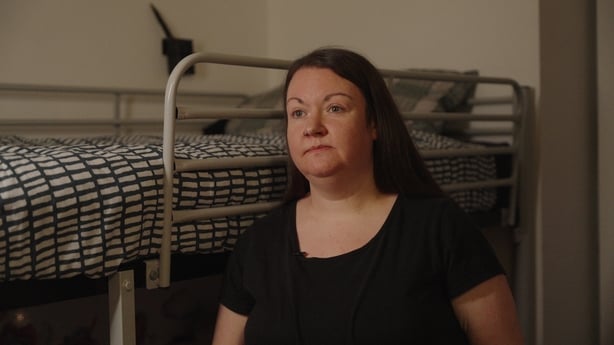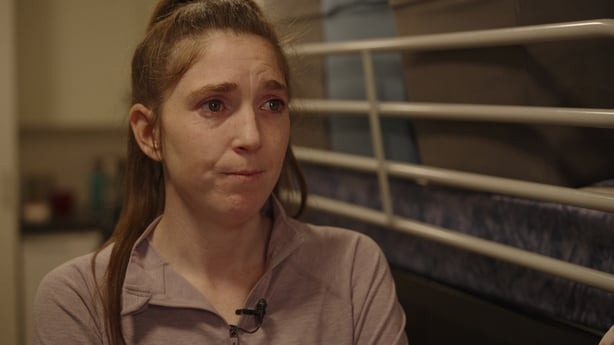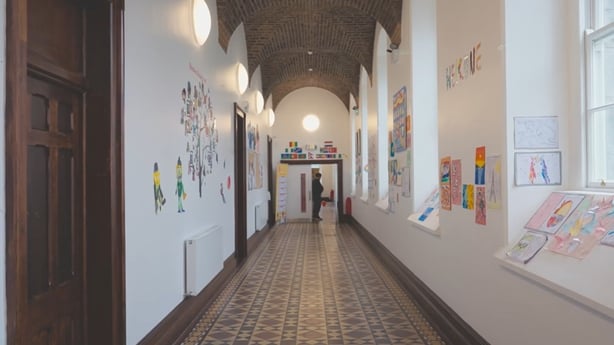Houben House is Ireland's largest homeless hub specifically for families. Located in Dublin’s Harold’s Cross, and run by The Salvation Army, it is home to more than 60 families currently.
On Monday night, a special Upfront with Katie Hannon programme was broadcast from the centre.
Ahead of the programme, some of the mothers and families living there, as well as staff members, spoke to the Upfront team.
Watch: Upfront with Katie Hannon: Ireland's largest family homeless hub
Ciara Lyons has been married six years and has three children. The eldest is 15 and the youngest just five. She describes her family as "middle income", and said she is shocked to find herself living with her husband and children in Houben House.
For 13 years prior to 2023, they rented in parts of south Dublin until their landlord needed to move back into the house.
"We got notice in June of 2022 and then the winter eviction ban came in, so we got a bit of extra time," she said.
"We'd been looking constantly trying to get anything - we couldn't get anything," she told Upfront with Katie Hannon.

In April 2023 Ciara, her husband, and her children moved in with her parents.
At the time her husband worked in manufacturing, but he accepted an offer of redundancy a year or so later.
"We were thinking he'd get a job and the redundancy was going to kickstart our life, then it all went downhill," she said.
Soon after the redundancy was accepted, it became clear the living conditions in her parent's house were not working for the family.
The family went to hotels first, but Ciara said their money was quickly eaten up with paying for rooms between October and Christmas. Money had to go not just on accommodation, but on cooked food and washing their clothes in launderettes.
"It’s €17 a wash and then you’ve to dry them as well - the money goes pretty quick," Ciara said.
She said she was "constantly" ringing her local council, but was told that they fall outside the income threshold for assistance.
"I would like to know why middle earner people can’t get help."
The maximum basic income limits for social housing vary between local authorities, from €30,000 to €48,000, with the assessment considering a household’s average net income for the 12 months prior to an application.
As the family had an income above the threshold in the previous year, they do not qualify for the housing assistance payment (HAP) - which can only be accessed through a social housing list.
"They don't think about the fact that we’ve spent his wage on rent and everything - they just see a figure and think we’ve got money," Ciara said.
"We don’t qualify to be on the social housing list and also we don’t qualify as homeless," she added, referencing the income assessment.
"I'm worried they’re going to make us leave and we’ll have nowhere to go"
She recalls crying with her children in the car in the days before Christmas.
"I was talking to one man from the council, and he called me on Christmas Eve and he told me to go to Gardiner Street - that's another homeless hub," she said.
"We went there on Christmas Day and about two weeks later we came here."
Ciara doesn't know what the future holds for her and her family since moving to Houben House in January.
"It feels uncertain to me," she said. "I’m worried they’re going to make us leave and we’ll have nowhere to go."
Staff at Houben House say it’s now not uncommon for people to be placed in the centre who come from middle-income backgrounds.
"A lot of families are in a grey area of not being rich enough to own a house but in the eyes of policymakers they are too rich to be on a social housing list," Dean Marshall, who has worked at Houben House for three years, told Upfront with Katie Hannon.
"People might be not entitled to social housing but can’t rent," he said, adding he would like to see a policy review of how people are assessed for housing.
"Before you could only access services when you had an active housing application, now people’s shared earnings are too high for an application and the only supports are for us to advocate on their behalf."
He believes the profile of people in homelessness is changing.
"When you think of homeless you think of people out in the street, (but) we have residents who have worked in huge, reputable organisations," he said, "you wouldn’t think they were homeless in a million years."
"There’s a misconception that it’s their own fault that they are in services like ours."
'Five of us in one room'
Lisa McDermott and her four children, the youngest of which is just nine months old, have been living in Houben House since November 2024.
She said the room is a tight squeeze - with a seven-year-old, five-year-old, 21-month-old and a nine-month-old baby - and was meant to be a short-term solution, but it has turned into something else.
"There are five of us in one room living in bunk beds," she said, with the one-year-old baby sleeping in the bed with her and the baby sleeping in a travel cot.
"The reality is that it is a long-term solution for me," she added.

Prior to being placed in the hub she lived in a house in Dublin, with the rent partially paid by a housing assistance payment (HAP).
"I held on to that for four years, but the landlord wanted the house back and I ended up here. I came from a place like this before I got my house."
Lisa said she was glad the location of the hub meant she did not have to change the children's schools, but that it is "hard to get them back and forward."
"I have to bring two buggies and all with them. When I lived in the area it was easier."
"It’s depressing to have to come in here and it’s hard to keep my head up," she added.
Despite the concern about the space available, Lisa - who has lived in other homeless centres previously - said she is thankful to have a place in Houben House.
"Facilities here are a lot better, as it is geared for families. They do stuff for the kids - that's good."
Lisa and Ciara are two of 324 people currently living in Houben House.

"Some families are sick of being in homeless accommodation - they just want their house," said Chelsea Smith, who has been a key worker in the centre for just over two years.
While she believes that local authorities are "trying their best with building as much as they can" she is "not 100% sure what they can do to fix it."
"We are providing a safe environment for the families," Chelsea said, adding "we give them help with their washing, giving them their dinners - if there's anything they need that we can provide them with we will."
"We all have nine to ten families as key workers - we work closely with whatever situation they have going on."
This can include helping families dealing with local authorities, with housing and risk assessments, as well as doing well-being checks.
"I don’t think people actually realise the extent of the hub and what goes on what behind closed doors," Chelsea said.
"They don’t understand that people actually have to live in the hubs. I think they think it’s a day service and they don’t realise it’s a 24-hour service."
On Upfront with Katie Hannon tonight at 10.35pm on RTÉ One and the RTÉ Player, families tell their stories about life in Ireland’s largest family homeless hub.

